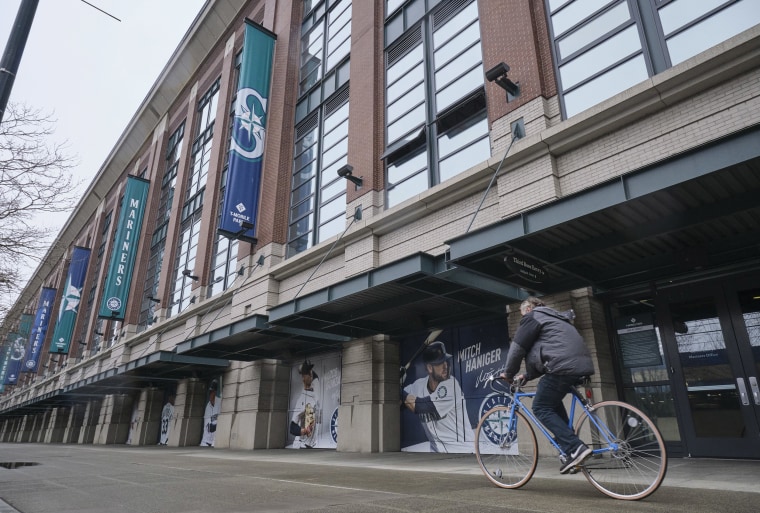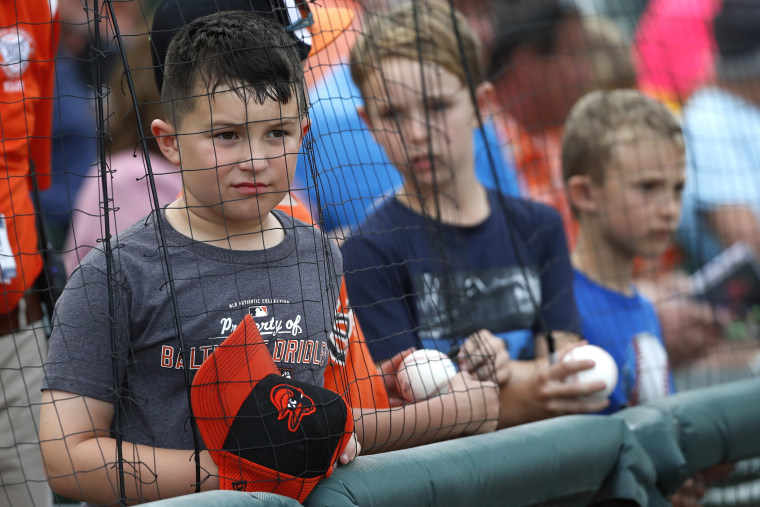Major League Baseball announced Thursday that it will suspend spring training in response to the coronavirus outbreak and delay the start of the regular season by at least two weeks.
"Following a call with the 30 Clubs, and after consultation with the Major League Baseball Players Association, Commissioner Robert D. Manfred, Jr. today announced that MLB has decided to suspend Spring Training games and to delay the start of the 2020 regular season by at least two weeks due to the national emergency created by the coronavirus pandemic," the statement from MLB said.
"This action is being taken in the interests of the safety and well-being of our players, Clubs and our millions of loyal fans."
MLB said it would announce contingency plans for the regular season at an "appropriate time" with the "hope of resuming normal operations as soon as possible."
But the question of whether to compensate players for missed games "is going to be the subject of bargaining," a baseball source told NBC News. "This has to be [collectively] bargained. It's the only path."
"Guys are gong to start missing paychecks," the source said.
MLB had already joined the NBA, the NHL and Major League Soccer this week in establishing a policy of no access to clubhouses and locker rooms for media and nonessential employees, prompting speculation about the eventual delay or cancellation of the baseball season.
MLB's decision comes after the NBA announced Wednesday that it would suspend its season after a player for the Utah Jazz had tested positive. A second Jazz player has since tested positive.
A major league executive said Wednesday that all the buzz at spring training sites in Florida and Arizona this week has been about team owners, executives and players contemplating — and preparing for — a brave new sports world in the time of the coronavirus.

"But then you're talking about what's next, and in a couple of weeks nobody knows what the circumstances will be like at that time," the executive said, referring to how quickly events are changing and decisions are being made in response to the global pandemic.
"And the real wild card is if a (major league) player gets sick with the coronavirus, does only the player get isolated? Or the rest of the team, too?" the executive said.
One major league team had already had its schedule altered as a result of coronavirus. The Seattle Mariners were not going to play games at home stadium T-Mobile Park in March after Washington Gov. Jay Inslee announced a ban on gatherings of 250 or more people through the end of the month in three counties, including King County, where the Mariners play.
And the California Health Department issued a similar ban on large gatherings, which could have affected home openers played by the Oakland A's, the San Diego Padres and the Los Angeles Dodgers.
Before MLB announced its decision Thursday, the players' union said, "Players want to compete and provide entertainment to fans. The Association’s focus will remain finding ways to do so in an environment that protects not just players’ personal health and safety, but also the health and safety of fans, umpires, ballpark employees, club employees and everyone in the baseball family.”
One NBA team owner, Mark Cuban of the Dallas Mavericks, said earlier that he thought the basketball league made the right call Wednesday in canceling the remainder of its season.
"It's stunning. But we are where we are. We have to be smart in how we respond. This isn't about basketball. This is a global pandemic where people's lives are at stake," Cuban said.
As to the potential economic effect on MLB, sports economist and Smith College professor Andrew Zimbalist said prior to the announcement that team owners would see a minimal economic setback if the games went on but without fans.
"It would be another matter altogether if you canceled the games," Zimbalist added.
Marc Ganis, the president of Chicago-based Sportscorp Ltd., a sports marketing firm, said there is a reason why sports leagues like Major League Baseball require that owners have strong balance sheets.
"When there are unexpected events like a coronavirus pandemic, (owners) can handle these kinds of unexpected financial problems more efficiently," said Ganis, who has consulted with MLB teams. "In Major League Baseball, the loss of revenue will not be partially made up by lowering the cost of player salaries. In the NBA and NHL, the players receive roughly 50 percent of the revenue, so if the revenues go down, the players will take a reduction. Baseball does not have that kind of arrangement with its Players Association. The owners in baseball will bear the brunt of the losses themselves."
Steve Stodghill, the former team counsel to Cuban and the Dallas Mavericks, said "there will certainly be a short-term economic impact on sports franchises."
"They will lose revenue," he said. "They'll have to refund ticket sales in the NBA and NHL; they will lose all revenues of concessions, merchandise. They may have to refund ad revenue. Networks may be seeking accommodation since they're not receiving the product they negotiated."
But the leagues and teams will endure.
"Leagues are well-funded," he said. "Most franchises have strong financial backing."
